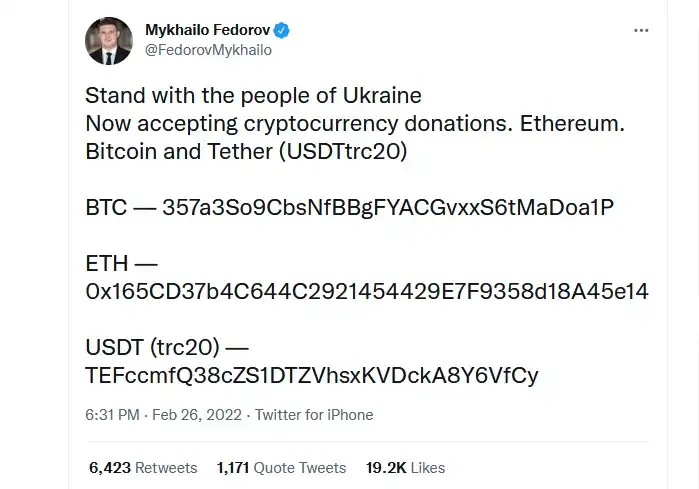The government of Ukraine has managed to raise cryptocurrency worth almost $13 million after posting appeals on social media for donations of bitcoin and other digital tokens, data from blockchain analysis firm Elliptic showed on Monday, according to a Reuters report.
Ukraine’s official Twitter account made the appeal for cryptocurrency donations on Saturday following the country’s invasion by Russia, posting digital wallets addresses for tokens including bitcoin and ether.
Ukraine’s Vice-Prime Minister Mykhailo Fedorov tweeted the wallet addresses. “Stand with the people of Ukraine. Now accepting cryptocurrency donations,” wrote Fedorov, who is also minister of digital transformation.
The donations came as Russian forces seized two small cities in southeastern Ukraine and the area around a nuclear power plant, the Interfax news agency said, but ran into stiff resistance elsewhere as Moscow’s diplomatic and economic isolation deepened.
The wallet addresses had received cryptocurrency worth $12.8 million across almost 17,300 donations by 08:50 GMT Monday, London-based Elliptic said. The company tracks the movement of digital coins on the blockchain, a public ledger that records crypto transactions.
Confirmation of the Tweet about Cryptocurrency

Ukraine’s ministry of digital transformation confirmed the tweets were genuine and added: “How will we use money? To destroy as much Russian soldiers as possible.”
Keep Reading: Ukraine Seeks South Korea’s Cybersecurity Assistance amid Russia Invasion
The crypto crowdfunding appeal of Ukrainian government is unprecedented. Though some states, notably El Salvador, have embraced cryptocurrencies, Ukraine’s appeal for direct donations is among the first of its type.
Cryptocurrency donations to Ukrainian volunteer and hacking groups have also spiked since Russia launched its invasion on Thursday, Elliptic said this week.
The donations to such groups, some of which have supplied equipment to government forces, grew strongly in January as Russia massed troops near Ukraine’s border ahead of its invasion.
By Tom Wilson, Thomson Reuters 2022







